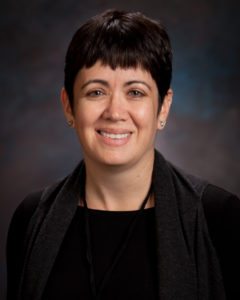 By Brian Powell
By Brian Powell
Flinn Foundation
When Dr. Christina Kwasnica entered medical school following her years as a Flinn Scholar at the University of Arizona, she wanted to work in a field where she could form long-lasting relationships with her patients.
And in the 17 years since joining Barrow Neurological Institute at Dignity Health St. Joseph’s Hospital and Medical Center in Phoenix, Kwasnica’s work in brain-injury rehabilitation has allowed her to do just that.
“I’ve watched patients over 10-15 years still make gradual improvements, and that was exactly what I was looking for in a field,” Kwasnica says. “I wanted to see the little changes and have people be excited about seeing the doctor.”
Kwasnica, a Class of 1987 Flinn Scholar and graduate of Dobson High School in Mesa, is the medical director of neuro-rehabilitation and the Center for Transitional Neuro-Rehabilitation at Barrow Neurological Institute, where she works with adults and children with brain and spinal-cord injuries, helping them to walk and speak again.
She sees accident victims, including those with concussions, and tends to work with the more severe end of the spectrum, as well as those with lifelong disabilities. She provides both physical and cognitive rehabilitation, with a focus on the cognitive rehabilitation of brain injuries. The Northwestern University Feinberg School of Medicine graduate is a member of the American Academy of Physical Medicine and Rehabilitation, the Academy of Academic Physiatrists, and the American Academy of Cerebral Palsy and Developmental Medicine.
Kwasnica is also conducting research in conjunction with Arizona State University in soft robotics with the goal of assisting stroke patients with walking.
Her desire for long-term commitments, however, do not lie solely with her patients.
Kwasnica has maintained a 30-year relationship with the Flinn Foundation and its prestigious scholarship program, and is motivated to participate in new ways to help her hometown state.
Outside the hospital, Kwasnica has served on the Governor’s Council for Spinal and Head Injuries.
“I’m thinking about how else I’m going to serve my community in Arizona and figuring out how to balance serving patients and maybe in the political realm,” Kwasnica says.
THE FLINN SCHOLARSHIP
Kwasnica was a member of the second class of Flinn Scholars, which today includes more than 600 current students and alumni of Arizona State University, Northern Arizona University, and the University of Arizona. She remembers a high-school counselor telling her about the program and saying it sounded just like her.
“I had a background of being diverse and well-rounded, not just a good student, and was involved in the arts, speech and debate, and sports,” Kwasnica says.
Even though the program was new, without the reputation it holds today, she turned down out-of-state offers and accepted the Flinn Scholarship–partly for financial reasons but also because she thought it was an amazing opportunity. She majored in political science even though she knew she wanted to go to medical school, knowing this was perhaps her last opportunity to study whatever she wanted.
Kwasnica still stays in touch with her fellow Flinn Scholars, who include those she met through her brother, Anthony, a Class of 1990 Flinn Scholar and current professor at Penn State University.
She’s given back to the program by serving on the Flinn Scholarship Review Committee, whose members review applications and interview Semifinalists for the Scholarship. Each October, more than 700 Arizona high-school seniors—this year, closer to 900—apply for the 20 awards. The new Scholars are announced in April.
“Just because you are in a million clubs or have perfect test scores doesn’t necessarily give you all those intangibles,” Kwasnica says. “It’s a hard thing to explain. You have to be not just intelligent but inquisitive, curious, and pushing the envelope a little bit.”
She’s also attended the Flinn Foundation’s annual Arizona’s Bioscience Roadmap events, which feature speakers and the release of biennial data showing the state’s progress in the biosciences.
RETURNING HOME
Kwasnica said after graduating from the University of Arizona, she was ready to leave her home state. She went to Northwestern University in Chicago for medical school followed by a fellowship.
“You don’t appreciate what you have until you leave it,” she says. “About five years into Northwestern I thought, I really want to go home, but I had to wait until I was done with my training and had the right opportunity.”
After completing her fellowship at Northwestern, she returned to Arizona for her first job, as director of brain-injury rehabilitation at Barrow Neurological Institute. Nine months later, she was overseeing all of the rehabilitation services at the internationally renowned medical center, which features one of the most successful therapy programs in the country for enabling patients’ return to work.
One advantage of being a Flinn Scholar working in Arizona, Kwasnica says, is the widespread knowledge of the Flinn Foundation and the Flinn Scholars Program.
“It holds a lot of weight and it’s impressive and it really did help open some doors,” Kwasnica said.
Read more about our Flinn Scholars